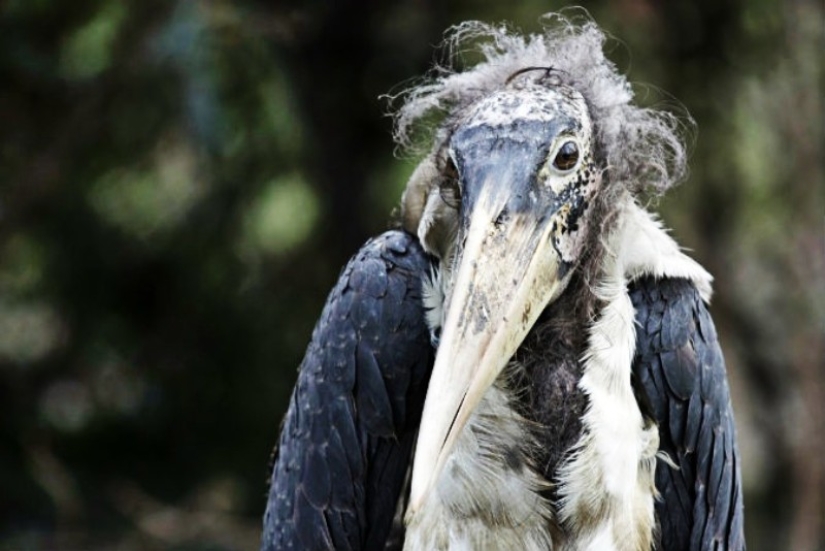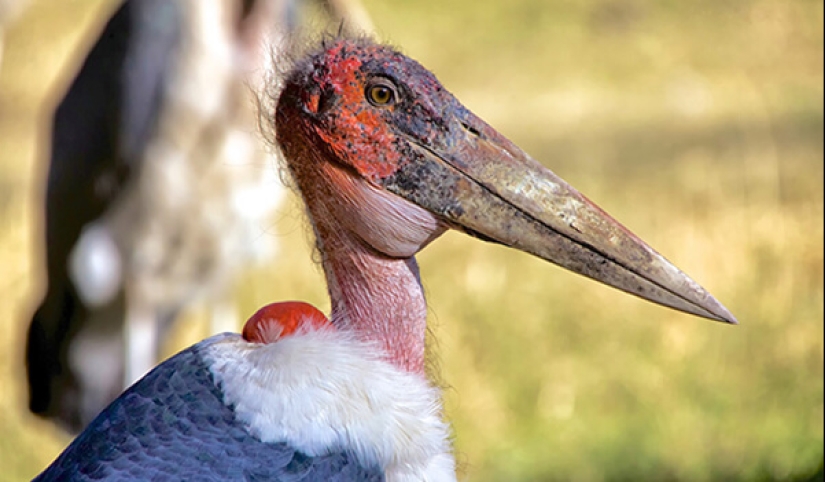Marabou — how the monstrous stork replaces pigeons and rats
Categories: Animals
By Pictolic https://pictolic.com/article/marabou-how-the-monstrous-stork-replaces-pigeons-and-rats.htmlIn our mythology, storks are birds of life, closely associated with motherhood and home comfort. But this does not apply to all birds of the stork family. The largest and most unpleasant representative of it is the marabou, which does not cause positive emotions at all. This bird is 1.5 meters tall, weighs 8-9 kg, and has a wingspan of up to 2.5 meters and lives in Africa and India. This is a creepy analogue of our rats and pigeons, absorbing everything they can reach with their massive beak.

In Africa and India, the marabou stork does not bring new lives, but takes them away. Its food can be anything from flamingo chicks and kittens to a half-decomposed buffalo corpse. Often these birds act in concert with hyenas. They patiently wait for the large predators to be sated so that they can start eating after them.

Nature has well adapted the marabou to their not too pleasant lifestyle. Birds have disproportionately large and sharp beaks capable of piercing skins and crushing bones. There are no feathers on the bird's head and neck, so it, like a vulture, can operate inside the carcass without fear of becoming a haven for millions of dangerous bacteria.

An ugly goiter is clearly visible on the bare neck of the marabou. Scientists have long believed that it plays an important role in the nutrition of poultry. But recent studies have shown that it is rather a "pillow". On this growth, the marabou puts a massive head when sleeping or just resting.

Like ordinary storks, marabou build large rough nests of branches at high altitude. But unlike their relatives from our latitudes, these birds do not seek solitude. 20-30 nests are located next to each other on the branches of large trees. In such a community, it is easier for marabou to defend against predators. Even one individual can give a thrashing to a fox or lynx. Rallying together against the enemy, they are almost invincible.

Interestingly, the unpleasant scavenger stork is very sensitive to family ties. When creating a pair, it is not the males who take care of the females, but vice versa. Having chosen each other, the birds build a nest together or occupy an existing one, and then take care of the laying. Marabou chicks become fully independent only at the age of 135 days.

Marabou nests are built for many years. Ornithologists have seen specimens that were more than 50 years old! We can say that the "family hearth" is being built once and for all, because these birds can live up to 40 years, and even longer in captivity. The chicks of the marabou appear in the least suitable period for this — in drought. When everything freezes around, broken by the heat, life is bubbling in the colony of these birds.

Up to 4 months, caring parents bring small animals to the offspring, which are 2-3 in the nest. Later, the fledgling young birds fly out to hunt with their parents and eat like adults, than they have to. Marabou with offspring can be seen both near the remains of the feast of predators, and in ordinary landfills. These birds get along well with people and can feed themselves among household garbage.

In different regions, people's attitude to marabou differs. Hindus and Arabs appreciate this bird as an environmental health worker. In some places, the brooding marabou is even considered a symbol of wisdom. But the African tribes do not like these storks and do not miss the opportunity to ruin the nest or even kill the bird. In some regions of the Black Continent, there are legends that marabou can kidnap a child. Theoretically, this will not be difficult for a large strong bird. But there are no statistics on such cases.
Recent articles

It's high time to admit that this whole hipster idea has gone too far. The concept has become so popular that even restaurants have ...

There is a perception that people only use 10% of their brain potential. But the heroes of our review, apparently, found a way to ...

New Year's is a time to surprise and delight loved ones not only with gifts but also with a unique presentation of the holiday ...